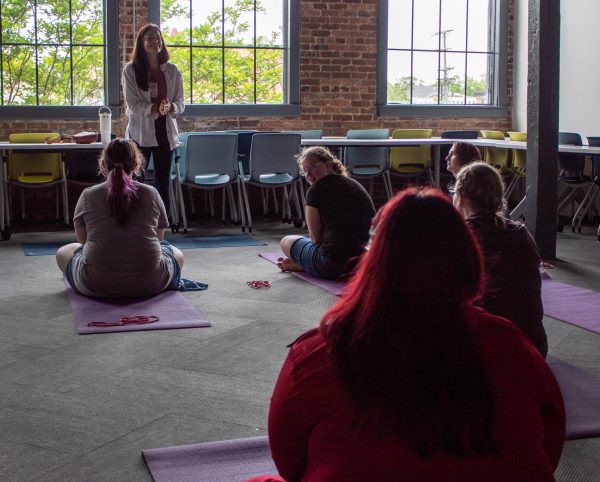UNA ROTC combats mental stresses of military
November 6, 2014
The military is often a deadly business, but not for the reason one might think.
In 2012 the Department of Defense reported 319 soldiers died by suicide as opposed to the 310 killed in active combat.
Twenty-two veterans and one active-duty soldier die by suicide each day, according to the Department of Veterans Affairs 2012 Suicide Data Report.
The tragedy not only affects those in the military, but it is the 10th leading cause of death in the U.S.
“(Suicide is) a problem with our society and the Army is dealing with the same problem,” said Lt. Col. William Pruett, chief instructor for senior UNA ROTC cadets.
Pruett said he thinks the stigma associated with mental health in the military is changing for the better.
“The official Army response under the ‘I. A.M. Strong’ campaign is there’s no effect to your military career if you choose to seek help,” he said. “Resources are available and we encourage (soldiers) to use them.”
He said the I. A.M. Strong slogan to Intervene, Act and Motivate is reflective of UNA ROTC’s values and teachings.
The program is required to offer suicide prevention and training as a part of the classroom curriculum every semester, on the freshman, sophomore, junior and senior levels.
“We have PowerPoint presentations that say, ‘here are the signs and symptoms, here are the resources that are available, here is how you notice signs and symptoms of those who might be considered at risk, and here’s how you mitigate those risks as leaders,’” Pruett said.
While a portion of the training is educational, he said, the other is a scenario or vignette-based training.
“If you’re taking ROTC, at an absolute minimum you’re going to have this training eight times,” he said.
Veteran and Business Management major Louis Miranda was not as prepared as those enrolled in the UNA ROTC program. He said his physical training was rigorous, but he received no emotional training while in the Army.
“In my own experience for a man to reach out suffering from PTSD, it’s hard because of the negative stigma that comes with it,” he said. “It’s seen as a weakness.”
Miranda joined in May 2001 and was medically discharged in 2003. He served stateside in Ft. Louis, Washington as an Army medic.
Miranda said he and his Army brothers never talked about the stresses of military life.
He said, however, the Veterans Affairs Care System has treated him well. He receives therapy for his PTSD and attends UNA free of charge from VA benefits.
ROTC cadets Jacob Weist and Alyssa Primeau said the cadre (ROTC faculty) has an open door policy for issues related to mental health.
“Along with the semester’s suicide prevention training, the cadre sits each cadet down and says, ‘This is our name, here’s our number, this is our address and this is our email. If you need to contact us about anything at all, feel free to contact us,’” Weist said.
Throughout Pruett’s personal military training, he said he has seen multiple ways of conducting suicide awareness and prevention training, but engaged leadership is the most effective method.
“Engaged leadership is where you know the people that you work with,” he said. “You know something about their lives, like where they were born or something about their friendships and relationships. The only way you can know that is to talk to people in a real way. That’s what I encourage here with all our staff — I just want them to listen.”
Pruett emphasized recognizing problems within oneself and the mental capabilities of others as strength, not weakness.
“Notice the signs and symptoms within yourself, and get yourself some help,” he said. “There is nothing wrong with that — it’s the right thing to do.”
The Army reports the main triggers for suicide behavior are: the breakup of a close relationship, drug or alcohol abuse, leaving old friends, being alone with concerns about self or family, financial stressors, humiliation, discharge from service and retirement, according to the Army Suicide Prevention Program.
Weist and Primeau both grew up in families that encouraged them to be of strong body and strong mind before they sought military careers, they said.
Weist said becoming mentally strong is a lifelong effort, but UNA ROTC has helped him become stronger.
“I just wanted to be a part of something bigger than myself,” Weist said.
The cadets said when they become leaders out in the field, knowing who the soldiers are, listening to them and making resources available to them is how they will enact their engaged leadership.










